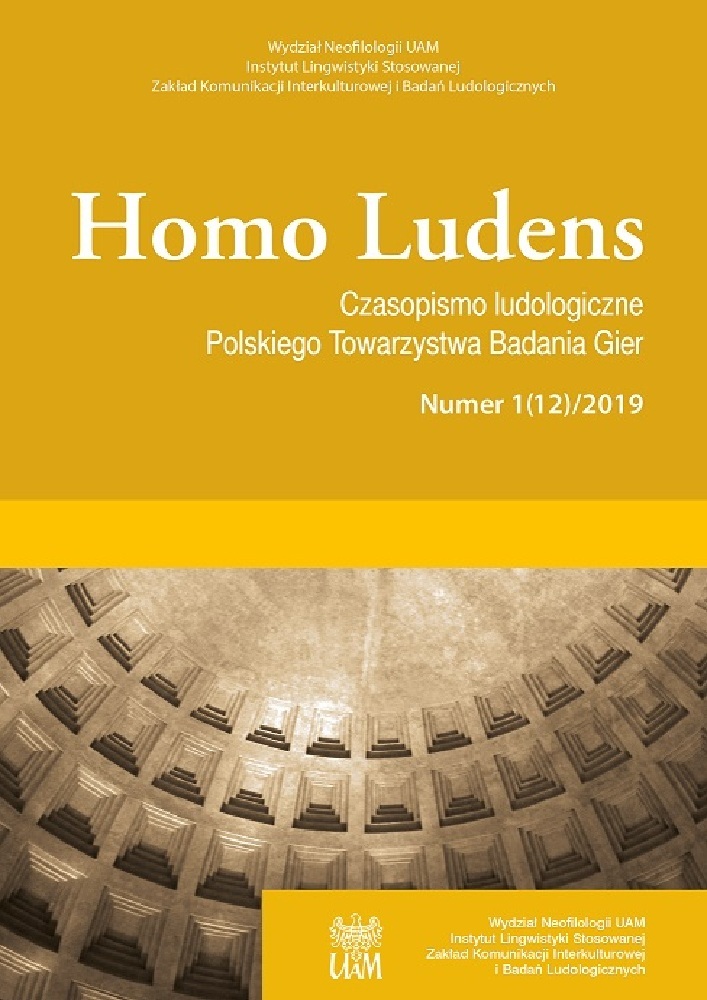Abstract
The article discusses the types of death in selected digital and tabletop games, sorting them into two groups: ones that follow the pattern of eternal return and allow the player to endlessly respawn in their worlds, and ones that limit the possibility of coming back. The article focuses on the latter, and analyses the mechanics limiting the access to the game – from permadeath, through the randomness and unique character of the events happening in online multiplayer games, up to permapermadeath – and the effects of the application of these mechanics.
References
Doki-doki-literature-club.fandom.com Possible Endings. Online: <https://doki-doki-literature-club.fandom.com/wiki/Possible_Endings>.
Freud, S. (1959). Beyond the pleasure principle. New York, NY: Bantam Books.
Gooding-Williams, R. (2011). The death of Nietzsche’s Zarathustra [Review of the book The Death of Nietzsche’s Zarathustra]. Notre Dame Philosophical Reviews. Retrieved from <https://ndpr.nd.edu/news/thedeath-of-nietzsche-s-zarathustra/>.
Grayson, N. (27th October 2016). One year later, those two perma-permadeath games aren’t doing so great. Online: <https://kotaku.com/one-year-later-those-two-perma-permadeath-games-arent-1788301072>.
Isbister, K. (2016). How Games Move Us. Cambridge MA: MIT Press.
Jayisgames.com (16th December 2010). One Chance – Walkthrough, Tips, Review. Online: <https://jayisgames.com/review/one-chance.php>.
Juul, J. (2013). The art of failure: An essay on the pain of playing video games. Cambridge MA: MIT Press.
Kirkeby, O.F. (no date). Pragmageton, The leadership of events. Online: <https://www.cbs.dk/files/cbs.dk/ofkspeech3rdmarch.pdf>.
Kubiński, P. (2016). Gry wideo. Zarys poetyki. Kraków: UNIVERSITAS.
Loeb, P. (2010). The death of Nietzsche’s Zarathustra. Cambridge: Cambridge University Press.
McGonigal, J. (2010). Gaming can make a better world [Video]. Online: <https://www.ted.com/talks/jane_mcgonigal_gaming_can_make_a_better_world# t-603894>.
Meer, A. (2010). One Chance, 1470 Words. Retrieved from .
Murray, J. (2000). Hamlet on the holodeck: The future of narrative in cyberspace. Cambridge MA: MIT Press.
Nietzsche, F. (2014). Tako rzecze Zaratustra. Poznań: Wydawnictwo Zysk i S-ka.
Rohrer, J. (no date). The Castle Doctrine. Online: <https://store.steampowered.com/app/249570/The_Castle_Doctrine/?l=danish&curator_clanid=2669017>.
Shapiro, F. (2008). Who Wrote the Serenity Prayer? Online: <http://archives.yalealumnimagazine.com/issues/2008_07/serenity.html>.
Date of access to all online sources: 24th December 2018.
Ludography
bit Studios (2014). This War of Mine [multi-platform]. 11bit Studios, Poland.
Blizzard Entertainment (2012). Diablo III [multi-platform]. Blizzard Entertainment,US.
Leacock, M. and R. Daviau. (2017). Pandemic Legacy: Season 2 [boardgame]. Asmodee and Z-man Games, US.
Moynihan, D. (2010). One Chance. [online]. Awkward Silence Games, England. Retrieved from <https://www.kongregate.com/games/Lemmi-Beans/one-chance>.
Rohrer, J. (2018). One Hour One Life [PC, iOS]. Jason Rohrer, US.
Rohrer, J. (2014). The Castle Doctrine [PC, iOS]. Jason Rohrer, US.
Team Salvato (2017). Doki Doki Literature Club [PC, iOS]. Team Salvato, US.
